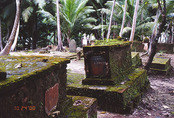Sentry Page Protection
Please Wait...
Andaman Islands
under construction
under construction
The first Briton to survey the Islands was Lieut. Blair who developed a small settlement on the island of Chatham in 1789 and who gave his name to Port Blair. Ross Island is the smallest of the Andaman’s, less than two square miles and lies at the entrance to Port Blair’s large harbour. The islands were abandoned by the East India Company in1796 but surveying started again fifty years later. By March 1858 the first Superintendent of Jails, Dr. James Patterson Walker, had arrived together with two ships and the first batch of 200 Indian convicts. Some were intellectuals, unused to the physical work expected of them as the dense jungle was pushed back. Sixty per cent died during their first year. Gradually British buildings rose amongst the lush landscape – the timber Government House, the Jail Superintendent’s bungalow, stone barracks for the British troops, the Anglican church, Ross pier, houses, a hospital, the club, the treasury, the armoury and the Commissariat. M.M. Kaye, the author, who stayed at Government House in 1933 and subsequently wrote an adventure novel based in the islands remembers it as “a large, old and rather gloomy building full of bats and curious echoes. It housed some magnificent carved furniture – the work of Burmese convicts.” Next to the handsome church, with its belfry, lay the cemetery. There were many inscriptions to young people struck down by cholera, dysentery and malaria, dating from the early1860’s.
One of the last English travellers to stay on Ross was Lady Diana Duff Cooper, who was fleeing from Singapore in the face of the advancing Japanese. She noted on the 16th January 1942 that “there is a barrack, a post office, a club, a church and parsonage, a village institute and that is about all, except for an old circuit house, lately turned into a guest house for air travellers.” By March that year the Japanese Navy were installed and the British were gone. At the end of the war, the Japanese left as prisoners, but the British did not return to their Ross Island houses. Extract from the Indian National Trust Journal
One of the last English travellers to stay on Ross was Lady Diana Duff Cooper, who was fleeing from Singapore in the face of the advancing Japanese. She noted on the 16th January 1942 that “there is a barrack, a post office, a club, a church and parsonage, a village institute and that is about all, except for an old circuit house, lately turned into a guest house for air travellers.” By March that year the Japanese Navy were installed and the British were gone. At the end of the war, the Japanese left as prisoners, but the British did not return to their Ross Island houses. Extract from the Indian National Trust Journal



